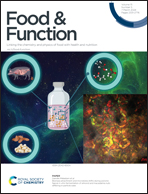Fabrication of zein–tamarind seed polysaccharide–curcumin nanocomplexes: their characterization and impact on alleviating colitis and gut microbiota dysbiosis in mice
Abstract
In this work, a zein–tamarind seed polysaccharide (TSP) co-delivery system was fabricated using an anti-solvent precipitation method. The formation mechanism, characterization, and effect on alleviating colitis and gut microbiota dysbiosis in mice of zein–TSP–curcumin (Z/T-Cur) nanocomplexes were investigated. Hydrogen bonding and the hydrophobic effect played a key role in the formation of Z/T-Cur nanocomplexes, and the interactions were spontaneous and driven by enthalpy. The encapsulation efficiency, loading capacity, and bioavailability increased from 60.8% (Zein-Cur) to 91.7% (Z/T-Cur1:1), from 6.1% (Zein-Cur) to 18.3% (Z/T-Cur1:1), and from 4.7% (Zein-Cur) to 20.0% (Z/T-Cur1:1), respectively. The Z/T-Cur significantly alleviated colitis symptoms in DSS-treated mice. Additionally, the prepared nanocomplexes rebalanced the gut microbiota composition of colitis mice by increasing the abundance of Akkermansia. Odoribacter and Monoglobus were rich in the Z-T-Cur treatment group, and Turicibacter and Bifidobacterium were rich in the zein–TSP treatment group. This study demonstrated that the TSP could be helpful in the targeted drug delivery system.



 Please wait while we load your content...
Please wait while we load your content...